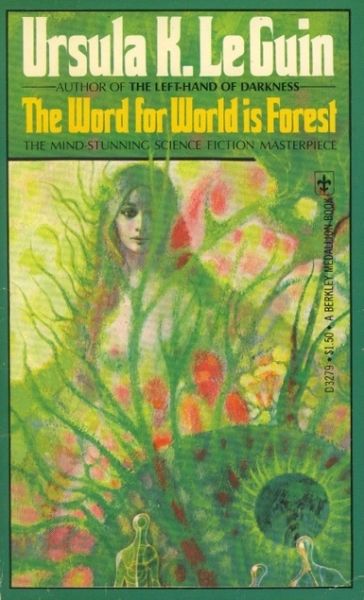Oh Simple Thing
The Word for World is Forest
By Ursula K. Le Guin

22 Mar, 2020
Ursula Le Guin’s 1972 The Word for World Is Forest takes place in her Hainish setting, during the League of Worlds period.
Three million years before the current era1, the Hain scattered humans across a swath of near space. Now after a long hiatus, various worlds have rediscovered nearly-as-fast-as-light star travel. Earth promptly applies its new NAFAL technology to colonialist exploitation.
Athshe is a world about twenty-seven light years from Earth, which means that there is a considerable time lag, fifty-four years, in communication with Earth. The Earth of this time is used up and overcrowded; the humans aim to repeat the failed experiment. They grab what worlds they can, to exploit as best they can. Athshe’s green-furred Athsheans are tiny compared to Terrans and technologically backward as well; having no tradition of mass violence, they have thus far been unable to resist the Terran invasion of their world, which the Terrans call New Tahiti. The Athsheans are being gradually displaced by the invaders.
Although Earth’s rules forbid enslaving locals, colonial worlds are effectively autonomous. The Terrans have a nasty habit of rounding up Athsheans and setting them to work; these involuntary and unpaid workers are call “volunteers.” The Athshean way of life and their use of lucid dreaming make them poorly suited for slavery. The Terrans resort to brutal methods to get the behavior they want out of the Athsheans. The Athsheans are humanoid enough for their women to be attractive to the Terran men, who greatly outnumber the Terran women on the planet. Athshean women often find themselves forced into sexual slavery.
Captain Davidson is a senior officer in the colonization effort, which is run by the Army; he is the least sympathetic character in the book. Wildly racist towards other Terrans and remarkably sexist towards women2 (whom he seems to regard as something akin to a useful domestic animal), an avid destroyer of ecosystems, he is perhaps the worst possible person to put in a position of power over the Athsheans3. He despises the indigenes and believes that they must be exterminated to make room for Terrans. Since his commanding officer has decreed that the Athsheans be used for labor, Davidson has settled for being a particularly brutal master. He oversees Smith Camp, one of several work camps on New Tahiti.
The Athsheans are a very peaceful people. Davidson manages the difficult task of convincing one Athshean named Selver that there is no peaceful solution to the matter of the Terrans. Terrans have the advantage of size, technology, and history when it comes to violent conflict. The Athsheans have numbers and superior understanding of the territory. A brutal guerilla war ensues….
~oOo~
This is very short by modern standards: just over 168 pages.
There are no female characters of note in this book. All are supporting characters at best and some are just plot tokens; they are there to be victimized, thus showing just how bad Davidson and his ilk are.
Athshe is an implausibly homogenous planet; on land there’s but one biome. This biome is implausibly delicate; deforestation is a one-way process. At least on the scale of Terran settlement. Perhaps it could recover eventually. For a large value of eventually.
Le Guin resists any attempt to make Davidson even slightly sympathetic. He is so comprehensively unpleasant that even Sauron might eschew his company.
Le Guin manages to resist any temptation to deploy the What These People Need is a Honky trope (see Dances with Wolves, The Last Samurai). There are two somewhat sympathetic Earth people, but neither achieves much; they are both killed off as the plot unfolds. They are so peripheral that I don’t even have to mention their names. The Athsheans manage to liberate themselves (at the cost of PTSD and what are probably irreversible changes to their culture).
This book is very earnest in a 1970s sort of way. One might be tempted to contextualize it by pointing out that around the time it was written, Newt Gingrich was writing a dissertation defending Belgian policies in the Congo, Belgian rule being notable for such things as establishing a trade in black-market severed hands. But it’s a sad fact that many people are still keen on colonialism — see a D’Souza essay lauding the British in Kenya—so, even though by all rights this book should be as relevant as hot pants and the music of Creedance Clearwater Revival, the novel is still timely.
The Word for World is Forest is available here (Amazon US), here (Amazon Canada), here (Amazon UK), here (Book Depository), and here (Chapters-Indigo).
1: Somewhere a biologist is crying. Because we know damn well that homo sapiensdeveloped here on Earth; we have the fossils.
2: He’s sexist by our current standards. Perhaps he’s normal for the Terran culture of that setting.
3: But Davidson is all too believable, given what other colonialists have done to the people they regard as lesser sorts. Davidson is nothing compared to Lothar von Trotha, for example.
